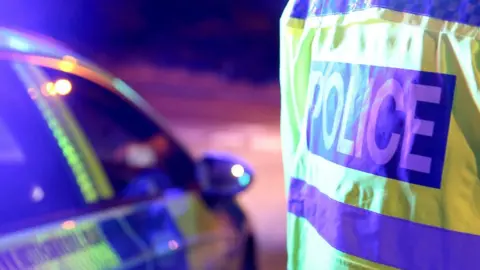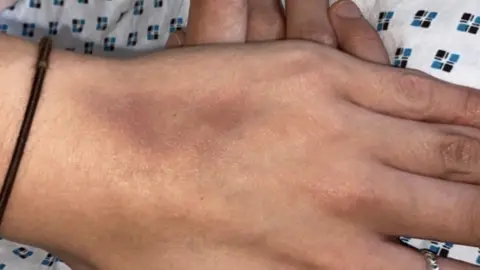Nottinghamshire Police investigate 15 reports of needle spiking
A police force is investigating 15 reports of spiking where the victims believe they were injected with a needle.
Nottinghamshire Police said victims reported effects that were "consistent with a substance being administered".
In one case an injury was also sustained "which could be consistent with a needle", the force said.
It is planning to deploy more police officers to the city centre over the next few weekends.
 Nottinghamshire Police
Nottinghamshire PoliceNottinghamshire Police said the first report of a person being spiked with "something sharp" was made on 2 October.
There have also been 32 reports of people being spiked by having their drink contaminated since 4 September.
"These figures have increased throughout October with the largest number of reports being made last weekend," the force added.
Police said the offences were believed to have happened on different days and at different venues.
The majority of reports are being made by young women, particularly students, but there have also been reports of young men being potentially spiked too, police said.
A 20-year-old man was arrested as part of a wider investigation into spiking.
It followed a report of suspicious activity on Lower Parliament Street on 16 October.
He has been released on conditional bail.
Nottinghamshire Police said a meeting had been held to discuss a response to the issue.
It involved the University of Nottingham, Nottingham Trent University, Nottingham City Council, East Midlands Ambulance Service and hospital trusts.
The force said it would be deploying more officers to the city centre over the next few weekends.
There will be a planned operation with the force's police dogs on Saturday.
Supt Kathryn Craner, of Nottinghamshire Police, said: "I understand that these reports and those from other cities are concerning but want to reassure people that we have been working with our partner agencies and licensed premises throughout the city to help tackle any reports of spiking."
Hepatitis test
Sarah Buckle woke up in hospital after a suspected spiking incident in a Nottingham nightclub in September.
The 19-year-old told BBC Radio Nottingham she had to have a hepatitis test after a pin prick wound was found on her hand.
She said since she spoke about her experience, others have got in touch to share what happened to them, and said she still feels "incredibly nervous" when out at night.
"I've had numerous people reach out to me essentially saying 'this happened to me the week [before], but I thought I was going crazy because I hadn't heard of it'," she said.
"This wasn't how I thought you got spiked - I thought it was just through your drink.
"I've been out a few times since and I haven't had much to drink at all, or I've been completely sober, and it actually hasn't made me feel any better.
"[Clubbing] is quite a physical experience, so you can't have eyes everywhere.
"There are people suspecting they've been spiked in so many different parts of their body - you can't look out for that, whether you're sober or not, and it's just really terrifying having no clue what's going on."
 Sarah Buckle
Sarah BucklePeople in other parts of the country have come forward to report similar incidents in recent weeks, including a second-year Loughborough University student who said she was injected in the elbow at a student union bar.
"I don't remember actually getting spiked, I just remember going dizzy and collapsing in the smoking area," she said.
The student said a doctor later confirmed that she had been injected, and she went to hospital for monitoring after experiencing heart palpitations.
However, she added she did not report the incident to police as she was not confident it would be properly looked into.
Police encouraged anyone who has been the victim of a similar offence to report it, while the university urged the student to come forward "so we can fully investigate".
Meanwhile, Devon and Cornwall Police say they are investigating reports of a woman being attacked with a needle in Fever and Boutique in Exeter on Saturday.
 Hannah Thomson
Hannah Thomson'Heinous crime'
More than 150,000 have signed a petition calling for nightclubs to "thoroughly" search customers on entry, and Home Secretary Priti Patel has asked police forces to examine the issue.
Mike Kill, chairman of the Night Time Industries Association, said the government should hold an inquiry into spiking.
He said his members have "definitely seen more cases" being reported, adding clubs are "taking our responsibilities here very seriously" and are working to raise awareness about efforts to train staff and keep people safe.
"Without a doubt we're going to see a step up on people being searched on entry," he said.
"There is no [specific criminal] categorisation in terms of spiking, so I think there's some work that needs to be done in terms of the Home Office, the policing and the collaboration with the industry to ensure that we're starting to get convictions to send a very clear message to people who feel they can carry out this heinous crime."
Meanwhile, Nottingham City Council said it would hold talks with door staff and nightclub managers to see what more can be done to keep customers safe.
Councillor Toby Neal, chairman of the authority's licensing committee, told the Local Democracy Reporting Service: "There is clearly a matter of concern here and we need to understand what is going on.
"It is really worrying. Are a group of blokes going around doing this stuff and what are we going to do to protect people?"
 PA Media
PA MediaYvette Cooper, chair of the Home Affairs Select Committee, urged police forces to work closer with hospitals, student groups and nightclubs to get a fuller picture of the scale of spiking.
"My concern is that they just don't have a proper assessment of the scale of the problem," she said.
"Partly it's because there's not proper work being done between police forces and A&Es, for example, to try and identify the scale of the problem, or proper work being done with nightclubs or with student groups and organisations.
"I think there's a big problem here that we don't even know or have the accurate figures, and that also is contributing to the police not, I think, taking this seriously enough."

Follow BBC East Midlands on Facebook, Twitter, or Instagram. Send your story ideas to eastmidsnews@bbc.co.uk.
